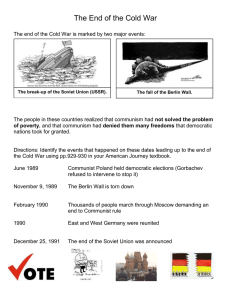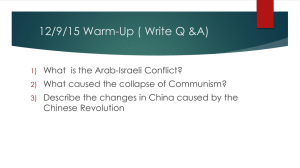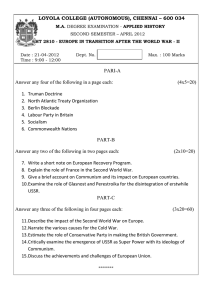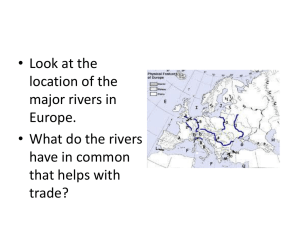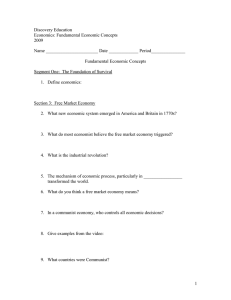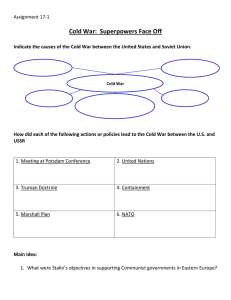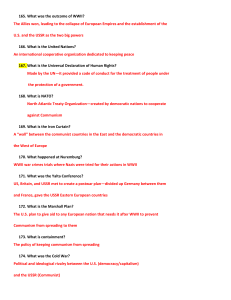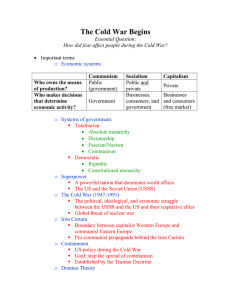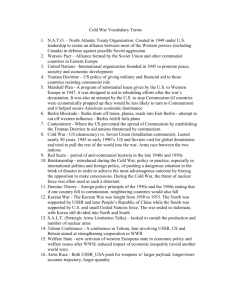4 QUARTER TEST STUDY GUIDE ANSWER KEY Renaissance and Reformation
advertisement
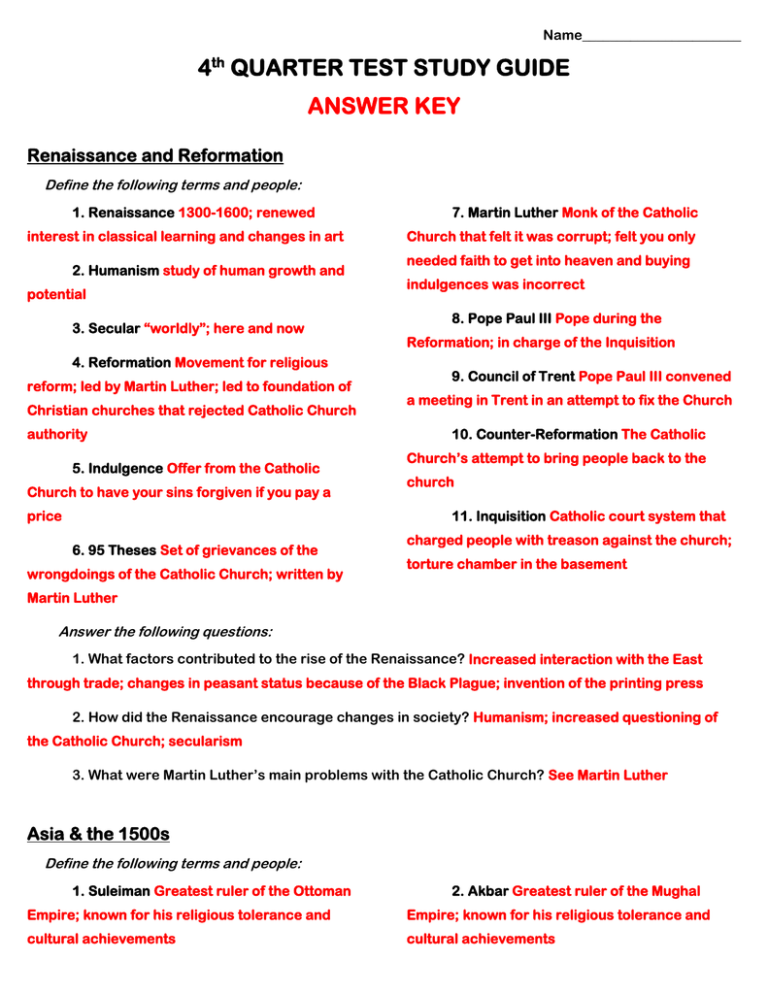
Name_______________________ 4th QUARTER TEST STUDY GUIDE ANSWER KEY Renaissance and Reformation Define the following terms and people: 1. Renaissance 1300-1600; renewed interest in classical learning and changes in art 2. Humanism study of human growth and potential 3. Secular “worldly”; here and now 4. Reformation Movement for religious reform; led by Martin Luther; led to foundation of Christian churches that rejected Catholic Church authority 5. Indulgence Offer from the Catholic Church to have your sins forgiven if you pay a price 7. Martin Luther Monk of the Catholic Church that felt it was corrupt; felt you only needed faith to get into heaven and buying indulgences was incorrect 8. Pope Paul III Pope during the Reformation; in charge of the Inquisition 9. Council of Trent Pope Paul III convened a meeting in Trent in an attempt to fix the Church 10. Counter-Reformation The Catholic Church’s attempt to bring people back to the church 11. Inquisition Catholic court system that 6. 95 Theses Set of grievances of the wrongdoings of the Catholic Church; written by charged people with treason against the church; torture chamber in the basement Martin Luther Answer the following questions: 1. What factors contributed to the rise of the Renaissance? Increased interaction with the East through trade; changes in peasant status because of the Black Plague; invention of the printing press 2. How did the Renaissance encourage changes in society? Humanism; increased questioning of the Catholic Church; secularism 3. What were Martin Luther’s main problems with the Catholic Church? See Martin Luther Asia & the 1500s Define the following terms and people: 1. Suleiman Greatest ruler of the Ottoman 2. Akbar Greatest ruler of the Mughal Empire; known for his religious tolerance and Empire; known for his religious tolerance and cultural achievements cultural achievements 3. Shah Jahan Mughal leader responsible for building the Taj Mahal 4. Taj Mahal Tomb built for Shah Jahan’s 5. Ottoman Empire Lasted from 1300s1900s; consisted of present-day Turkey, Arabic nations, eastern Europe, and north Africa wife; considered one of the 8 wonders of the world 6. Mughal Empire Lasted from 1500s1700s; consisted of present-day India and Pakistan Answer the following questions: 1. What was the name of the original capital of the Ottoman Empire? What was it changed to? Constantinople; Istanbul 2. What caused both the Ottoman and Mughal Empires to fail? Weak leaders and problems with transferring power to the next ruler Scientific Revolution Define the following terms and people: 1. Copernicus Discovered the heliocentric theory, disproving the geocentric theory 2. Galileo His scientific discoveries proved Copernican Theory, fixed accelerated rate, and law of the pendulum; died under house arrest because his findings did not go along with the Catholic Church 3. Newton Scientist who explained gravitational pull and proved Galileo’s theories 4. Vesalius 1st scientist to dissect a human body 5. Harvey 1st scientist to dissect a human heart & explain circulation 6. Geocentric Theory Earth is the center of the universe; thought of by Aristotle 7. Heliocentric Theory Sun is the center of the universe; proved by Copernicus Age of Exploration Define the following terms and people: 1. Columbus Italian explorer that sailed for 4. Magellan 1st Portuguese explorer to Spain; found the 1st western route to “India”, but circumnavigate the world; technically died before found the Americas instead the end 2. Dias 1st Portuguese explorer to attempt to find a trade route to India by sailing around Africa; only made it to the southern tip of Africa 3. Da Gama 1st Portuguese explorer to reach Calicut, India by sailing around Africa 5. Cortez Spanish conquistador that found the Aztec Empire in Mexico 6. Pizarro Spanish conquistador that found the Inca Empire in Peru 7. Drake English explorer; followed 8. Columbian Exchange global exchange of Magellan’s circumnavigation, but survived the goods, plants, animals, disease, & technology trip; pirated Spanish ships between Europe and the New World Answer the following question: 1. Resulting from the Columbian Exchange, name the two goods that had the greatest impact on the Americas. Guns and disease Age of Absolutism and Enlightenment Define the following terms and people: 1. Divine right Belief that power to rule was handed down by God 2. Absolute Monarchy Total power of a King; did not have to answer to anyone 3. Louis XIV (14th) King of France; built Palace of Versailles 4. John Locke Philosopher that believed in inalienable rights of life, liberty, & property; 5. Voltaire Philosopher that believed in freedom of speech and freedom of religion 6. Baron de Montesquieu Philosopher that believed in a separation of branches so that one group doesn’t become too powerful; “checks and balances” 7. Palace of Versailles Castle of the King of France; meant to show power and arouse envy influenced Declaration of Independence; wrote “Two Treatises of Government” French Revolution Define the following terms and people: 1. Storming of the Bastille Event that sparked the revolution; peasants attacked the prison, looking for gun powder 2. Tennis Court Oath Members of the 3rd Estate locked themselves in and remained there until they wrote a new constitution 3. Reign of Terror Led by Maximilien Robespierre; period of intense guillotine use 4. Louis XVI (16th) Absolute monarch who ruled prior to the revolution 5. Napoleon Dictator following the revolution; considered greatest French ruler Answer the following question: 1. What were the events that led to Napoleon’s demise? Failure of the Continental System, failed Peninsular War, and failed invasion of Russia Industrial Revolution Define the following terms and people: 1. Adam Smith Created capitalism; write “Wealth of Nations” 2. Karl Marx Created Socialism/Communism; wrote Communist Manifesto 3. Factory Large building used to house the big machines that no longer fit in a person’s home; sped up production and gave people jobs 4. Interchangeable parts Created by Henry Ford; sped up production of goods and made them less expensive 5. Assembly lines Created by Henry Ford; sped up production of goods and made them less expensive 5. James Watt Inventor of the steam engine 6. Henry Bessemer Inventor of steel 7. Eli Whitney Inventor of the Cotton Gin 8. “Laissez-faire” economics “Let the people do as they will”; free market economy; created by Adam Smith 9. Railroads and industrial growth Created thousands of jobs for people; fresh food could be delivered to places further away; faster method of transportation for people and goods Imperialism Define the following terms and people: 1. Imperialism To divide up countries and take control of those considered “less strong” 2. Berlin Conference Meeting in Berlin to discuss how to divide up Africa; no African 3. Sepoy Mutiny Lack of respect for the Indian culture by the British; rumor spread about the material of the bullet cartridges containing beef and pork fat against Hindu/Muslim religion leaders were consulted Answer the following question: 1. What were the main factors that caused Imperialism? Industrial Revolution; Search for raw materials and natural resources; Search for new markets in which to sell goods Nationalism and World War I Define the following terms and people: 1. Giuseppe Garibaldi Unified southern Italy with northern Italy 2. Otto von Bismarck United Prussia and 3. Realpolitik “politics of reality”; harsh, tough power politics 4. Serbia vs. Austria-Hungary Serbian German states, creating Germany; “realpolitik”; revolutionary assassinated Austrian Archduke assisted in bringing US into World War II Ferdinand; Austria declares war on Serbia; 1st spark of World War I 5. Mechanized war War utilizing man-made machines; created slower moving war with stalemates, massive destruction, and a larger number of casualties (deaths) 6. Trench warfare Type of warfare used in WWI; disgusting conditions 7. Allies vs. Central Powers Britain, France, US vs. Germany, Austria, Ottoman Empire 9. Nationalism Having pride in your country 10. League of Nations Alliance formed to prevent another world war; failed because of a lack of military involvement; US not involved 11. Treaty of Versailles 1919 Treaty that ended World War I; mostly blamed Germany 12. “War-guilt clause” Blame placed on Germany for starting WWI; had to pay war reparations; allowed very little military 8. Militarism Building up your military in case of war; increase power, size of country, economics, politics, etc. Answer the following question: 1. Name some of the results of World War I. Environmental and agricultural devastation; 22 million wounded; Economic despair across Europe Russian Revolution Define the following terms and people: 1. Capitalism Economic system based on supply and demand; created by Adam Smith 2. Communism Economic system based on equal distribution; created by Karl Marx 3. Lenin Communist leader of the Bolsheviks and the USSR 5. Czar Nicholas II Totalitarian dictator of Russia prior to the revolution; was overthrown due to his oppression of the people; built TransSiberian Railway 6. Duma Temporary government following the revolution 4. Bolsheviks Radical communist revolutionaries from USSR Interwar Years and World War II Define the following terms and people: 1. New Deal Roosevelt’s attempt to stimulate American economy by increasing government spending & creating jobs for the unemployed 2. Franklin D. Roosevelt President of US; employed New Deal strategy 3. Harry Truman President of US after FDR; dropped atomic bombs in Japan 4. Joseph Stalin Totalitarian dictator in USSR 13. Operation Overlord (D-Day) Allied invasion of Normandy, France 5. Winston Churchill Prime Minister of England; appeased Hitler before the war; “Iron 14. Operation Sea Lion Hitler’s invasion of Britain Curtain” speech during Cold War 5. Benito Mussolini Fascist leader of Italy; 15. Operation Barbarossa Hitler’s invasion of Soviet Union allies with Hitler 6. Adolf Hitler Fascist/Nazi leader of 16. Operation Torch Allied invasion of Egypt Germany 7. Hideki Tojo General of Japan’s army 8. Hirohito Emperor of Japan 9. Hiroshima and Nagasaki US atomic bombs were dropped on these two Japanese cities 17. Battle of Stalingrad Germans were defeated at this Russian city; turning point of the war 18. Anti-Semitism hatred/discrimination of Jews 19. Holocaust systematic killing of Jews; 10. Blitzkrieg Germany’s military strategy; “lightning war” 11. “Island hopping” US military strategy to take over islands gained by Japan, attacking one island at a time 12. Pearl Harbor Dec. 7, 1941; Japanese genocide 20. Non-aggression pact Germany’s agreement with Russia that was supposed to prevent conflict between these two nations 21. Allied vs. Axis Powers Britain, France, US, & USSR vs. Germany, Italy, & Japan attack on US; brought US into the war; “date that will live in infamy” Cold War Define the following terms and people: 1. Cold War period of tension between US & USSR 2. “Satellite nations” countries taken over by USSR to create a buffer zone with W. Europe 3. Containment attempt made by US to keep communism where it currently existed 4. Truman Doctrine financial support given to countries that rejected communism 5. Marshall Plan loans given to W. Europe from US to prevent the spread of communism 6. North Atlantic Treaty Organization alliance between US & 10 other W. Europe nations in case of war with USSR 7. Warsaw Pact alliance between USSR & satellite nations in case of war with US 8. Brinkmanship to go to the “edge of war”, without actually using nuclear weapons 9. Détente “relaxation” of Cold War tensions 10. Berlin Wall built in Berlin, Germany; divides West and East Germany; symbol of capitalism vs. communism 11. United Nations alliance of democratic nations around the world; had the ability to enforce its decisions with military force 12. Korean War capitalists in south; communists in north; still divided today along 38th parallel 13. Vietnam War capitalists in south; communists in north; communist country today 14. Fidel Castro communist leader in Cuba 15. Ho Chi Minh/Ngo Dinh Diem North Vietnam Communist; South Vietnam Nationalist 16. Mao Zedong/Chiang Kai Shek North China Communist; South China Nationalist 17. Nikita Khrushchev Communist leader of USSR; had Berlin Wall built 18. Mikhail Gorbachev Communist leader of USSR; Berlin wall came down; “glasnost” & “perestroika” African & Asian Decolonization Define the following terms and people: 1. Mau Mau Rebellion black Kenyans 6. Golda Meir and Israel Prime Minister of attempted to “scare” white Kenyans (British Israel; a nation-state created by United Nations heritage) out of Kenya for the Jews 2. Jomo Kenyatta elected 1st president of Kenya 7. Israel and Palestine Division created by United Nations; Israel for Jews and Palestine for 3. Apartheid system of legalized racial segregation in South Africa 4. Nelson Mandela leader of African National Congress; falsely accused of violent protests in South Africa & jailed for 27 years; later elected 1st black president of South Africa 5. Gamal Nasser and Suez Canal President of Egypt; restored ownership of Suez Canal to Egypt from British control Muslims & Christians 8. Partition of India and Pakistan created because of religious differences between Hindus & Muslims 9. Gandhi non-violent Hindu protestor for Indian independence; attempted to make peace between Hindus & Muslims; brought attention to struggles of lower class in India
